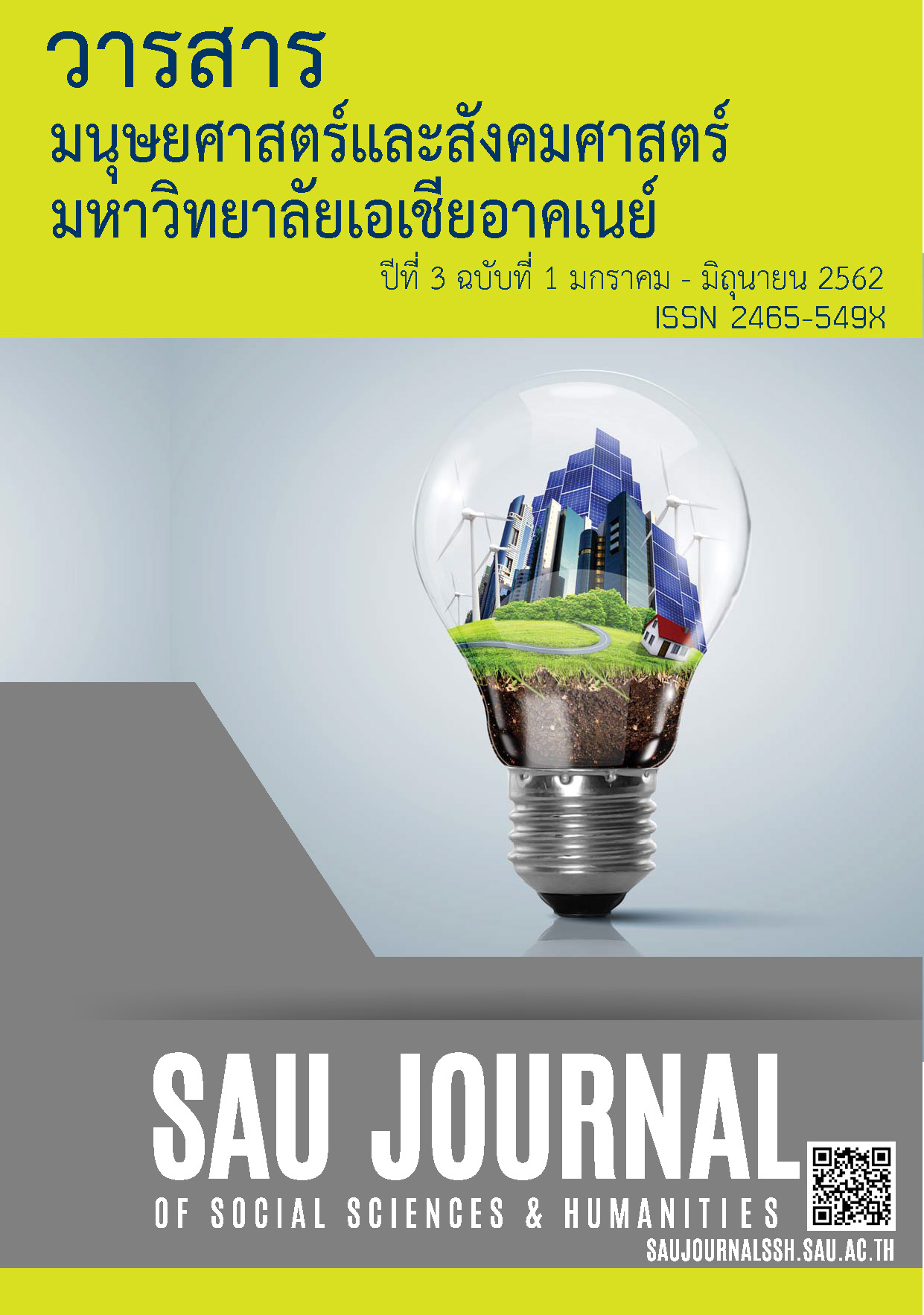อิทธิพลของตัวแปรกำกับเทคโนโลยีที่ถ่ำยโอนควำมสัมพันธ์ระหว่ำงวัฒนธรรมที่มุ่งเน้น กำรมีส่วนร่วมสู่กำรแบ่งปันควำมรู้ของผู้ประกอบกำรอุตสำหกรรม ผลิตเครื่องปรับอำกำศในเขตกรุงเทพมหำนคร
คำสำคัญ:
วัฒนธรรมที่มุ่งเน้นการมีส่วนร่วม, เทคโนโลยี, การแบ่งปันความรู้บทคัดย่อ
การวิจัยครั้งนี้มีวัตถุประสงค์เพื่อ (1) ศึกษาระดับวัฒนธรรมที่มุ่งเน้นการมีส่วนร่วม เทคโนโลยี และการแบ่งปันความรู้ และ (2) ศึกษาอิทธิพลของตัวแปรกากับเทคโนโลยีที่ถ่ายโอนความสัมพันธ์ระหว่างวัฒนธรรมที่มุ่งเน้นการมีส่วนร่วมสู่การแบ่งปันความรู้ของผู้ประกอบการอุตสาหกรรมผลิตเครื่องปรับอากาศในเขตกรุงเทพมหานคร โดยกลุ่มตัวอย่างที่ใช้ในการวิจัย คือ ผู้ประกอบการอุตสาหกรรมผลิตเครื่องปรับอากาศในเขตกรุงเทพมหานคร จานวน 105 ตัวอย่าง สถิติที่ใช้ในการวิจัยเป็นการวิเคราะห์ตัวแบบสมการโครงสร้าง ผลการศึกษา พบว่า (1) วัฒนธรรมที่มุ่งเน้นการมีส่วนร่วม เทคโนโลยี และการแบ่งปันความรู้มีค่าเฉลี่ยโดยรวมอยู่ในระดับมาก และ (2) อิทธิพลของตัวแปรกากับเทคโนโลยีมีอิทธิพลต่อการเข้ามาถ่ายโอนความสัมพันธ์ระหว่างวัฒนธรรมที่มุ่งเน้นการมีส่วนร่วมสู่การแบ่งปันความรู้ของผู้ประกอบการอุตสาหกรรมผลิตเครื่องปรับอากาศในเขตกรุงเทพมหานคร
เอกสารอ้างอิง
ธัญนันท์ บุญอยู่. (2561). อิทธิพลของความสามารถทางนวัตกรรมในฐานะตัวแปรคั่นกลางที่ถ่ายทอดอิทธิพลของวัฒนธรรมองค์การ การมุ่งเน้นการตลาด การจัดการความรู้ และการเป็นผู้ประกอบการสู่ความได้เปรียบในการแข่งขันอย่างยั่งยืนของอุตสาหกรรมรองเท้าและเครื่องหนัง. วารสารดุษฎีบัณฑิตทางสังคมศาสตร์ มหาวิทยาลัยรามคาแหง, 8(ฉบับพิเศษ), 44-62.
ศูนย์วิจัยกสิกรไทย. (2560). บทวิเคราะห์แนวโน้มธุรกิจ. ค้นเมื่อ 10 ธันวาคม 2561, จาก https:// kasikornresearch.com/th/ analysis /k-econ/business/Pages/36376.aspx.
Ahmady, G. A., Nikooravesh, A., & Mehrpour, M. (2016). Effect of organizational culture on knowledge management based on Denison model. Social and Behavioral Sciences, 230, 387-395.
Ahmed, F., Shahzad, K., Aslam, H., Bajwa, S. U., & Bahoo, R. (2016). The role of collaborative culture in knowledge sharing and creativity among employees. Pakistan Journal of Commerce and Social Sciences, 10(2), 335-358.
Al-Tit, A. A. (2016). The mediating role of knowledge management and the moderating part of organizational culture between HRM Practices and organizational performance. International Business Research, 9(1), 43-54.
Archer, K., Savage, R., Sanghera-Sidhu, S., Wood, E., Gottardo, A., & Chen, V. (2014). Examining the effectiveness of technology use in classrooms: A tertiary meta-analysis. Computers & Education, 78, 140-149.
Chuang, F. M., Morgan, R. E., & Robson, M. J. (2012). Clan culture, strategic orientation and new product performance in Chinese marketing ventures: An exploration of main and moderating effects. Journal of Strategic Marketing, 1, 1-20.
Daft, R. L. (2001). Organization theory and design. (7th ed.). Cincinnati, OH: South Western College Publishing.
Ertmer, P. A., & Ottenbreit-Leftwich, A. T. (2010). Teacher technology change: How knowledge, confidence, beliefs, and culture intersect. Journal of Research on technology in education, 42(3), 255-284.
Hair, J. F., Anderson, R. E., Tatham, R. L., & Black, W. C. (1998). Multivariate data analysis (5th ed.). New York: Prentice-Hall.
Hair, J. F., Sarstedt, M., Ringle, C., & Gudergan, S. P. (2018). SmartPLS 3. Retrieved March 8, 2019, from https://www.smartpls.com/downloads.
Islam, M. Z., Jasimuddin, S. M., & Hasan, I. (2014). Organizational culture, structure, technology infrastructure and knowledge sharing: Empirical evidence from MNCs based in Malaysia. Emerald, 45(1), 67-88.
Likert, R. A. (1932). A technique for the measurement of attitudes. Archives of Psychology, 140, 5-53.
Patalas-Maliszewska, J. (2014). Knowledge sharing barriers in the Polish manufacturing companies. Journal of International Studies, 7(1), 27-34.
Preacher, K. J. & Hayes, A. F. (2008). Asymptotic and resampling strategies for assessing and comparing indirect effects in multiple mediator models. Behavior Research Methods, 40, 879-891.
Theriou, N., Maditinos, D., & Theriou, G. (2011). Knowledge management enabler factors and firm performance: An empirical research of the Greek Medium and Large firms. European Research Studies, 40(2), 97-134.
Wentworth, D. K., & Middleton, J. H. (2014). Technology use and academic performance. Computers & Education, 78, 306-311.






